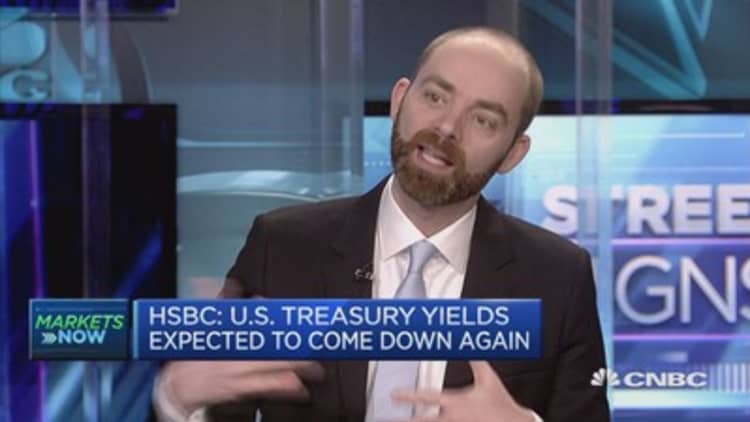European stocks are the cheapest they've been relative to their U.S. counterparts in nearly 40 years, and they have more upside potential for profit growth, making them an attractive buy even with looming political risk, according to analysts at Bank of America Merrill Lynch.
The analysts made a bullish case Thursday to buy Europe, based on the idea that corporate earnings there have bottomed and are set to see double-digit growth for the first time since 2010. On a price-to-book basis, Europe is the cheapest it has been to the U.S. in nearly 40 years.
European equities have seriously underperformed U.S. stocks over the past nine years, with the total return index for MSCI U.S. beating MSCI Europe by 105 percent in dollar terms from the trough in 2008.
That said, the political situation looks shakier on the Continent, with a number of elections this year. The most concerning by far is the French election. Nervousness about that vote, as well as Greece's interminable debt crises, have put pressure on bond yields recently.
Nationalist candidate Marine Le Pen, who has become increasingly popular in France, has said she would take the country off the euro. That could lead to the breakup of the entire euro zone — France is its second-biggest economy, after Germany — and would mark a tremendous blow to Europe considering that Britain voted to leave the European Union last June.
The Netherlands also has a March election, where another nationalist candidate is leading, but it is France that has been the big concern. The first round in the French presidential election is in April, and the second round is in May.
"That's clearly the downside risk. I think if Marine Le Pen was elected … it would call into question the integrity of the euro zone," said Ronan Carr, BofA European equity strategist.
Carr does not expect Le Pen to win, however, and either of the other two candidates are seen as positive for the markets, since they both would be reformists and pro-euro zone.

"I think it's quite conceivable we're sitting here in May and the markets find the outcome quite bullish. Between now and then the markets could be choppy, kind of like we saw with some of the political events we saw last year," he said. "Ultimately, I think once we work through the uncertainty the backdrop is very strong."
German and possibly Italian elections are expected later in the fall. There could be further volatility then.
"On the other hand, if and when current political risks stabilize, it could set the stage for European valuations to recover," according to the analysts' report.
Carr said while Greek bonds have been under pressure, he expects "an 11th-hour resolution" of its current debt issues.
European stocks should also benefit from the reflation trade — the boost U.S. markets are seen getting from lower taxes and new government spending on infrastructure — which has been driving U.S. stocks since President Donald Trump was elected.
Corporate Europe derives nearly half its earnings from outside the European economy, so the earnings upturn is tied to global growth, the analysts said.
Bank of America expects European earnings growth of 11 percent in 2017 because of the recovery in commodities, low margins and a currency tail wind. The analysts expect growth of just 9 percent in the U.S., and for 2018, earnings growth is expected to be 8 percent in Europe, versus 6 percent in the U.S.
Based on one-year forward price-earnings, MSCI Europe trades at 14.7 percent, a 17 percent discount to the MSCI U.S. at a 17.8 times.



